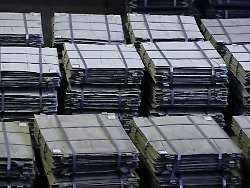Nickel prices rise
Ukraine war inhibits electric car production
3/31/2022 6:54 am
E-car manufacturers depend on nickel – and that is mainly mined in Russia. The prices for the metal have risen sharply recently, and the spread of electric cars is threatened by development, says an analyst. The industry should compensate for this in other ways.
According to experts, Russia’s war in Ukraine will make electric cars more expensive and could put a damper on the current change in the industry. The main reason is the increase in the price of nickel, said industry analyst Pedro Pacheco from the IT market researcher Gartner. Russia is a key source of the metal, which plays an important role in most electric vehicle batteries.
The production of cars with internal combustion engines will also be affected: For many European manufacturers in particular, Ukraine has previously been a supplier of cable connections – and Russia a supplier of palladium for catalytic converters. The expensive nickel “threatens the spread of electric cars” – just as the current jump in fuel prices is increasing interest in alternative drives, said Pacheco.
The consequences should not only be felt this year, but also in the coming year: “2022 and 2023 will be very different than it looked at the beginning of the year.” The shortage of chips, which made it difficult for car manufacturers to cope with the corona pandemic, could also worsen, because Ukraine is an important supplier of the gas neon, which is used in semiconductor production.
Mergers and acquisitions expected
Pacheco said the semiconductor problems had gotten the automakers off the hook financially because they were selling more expensive vehicles. “But the problem is, this year the scope for this is shrinking, because ultimately what matters is how much customers are willing to pay more.” At the same time, the price hikes in the supply chains are unlikely to give carmakers the opportunity to sell cars cheaper without incurring losses, especially in the case of electric cars. “And that will certainly affect the acceptance of electric vehicles.”
In the case of combustion engines, the middle price segment could shrink particularly sharply. The service life of vehicles could continue to increase. At the same time, the Gartner analyst does not rule out the possibility that Chinese car manufacturers could try to use access to Russian raw materials, which are cheaper for them, to expand their position both in Russia and on the world market in the event of a prolonged conflict.
In view of potentially falling car sales, it is now even more important for manufacturers to expand their digital services business. “Because ultimately, if you can’t sell cars, you have to sell something else.” Pacheco also anticipates new mergers and acquisitions in the industry as a result of the development.
